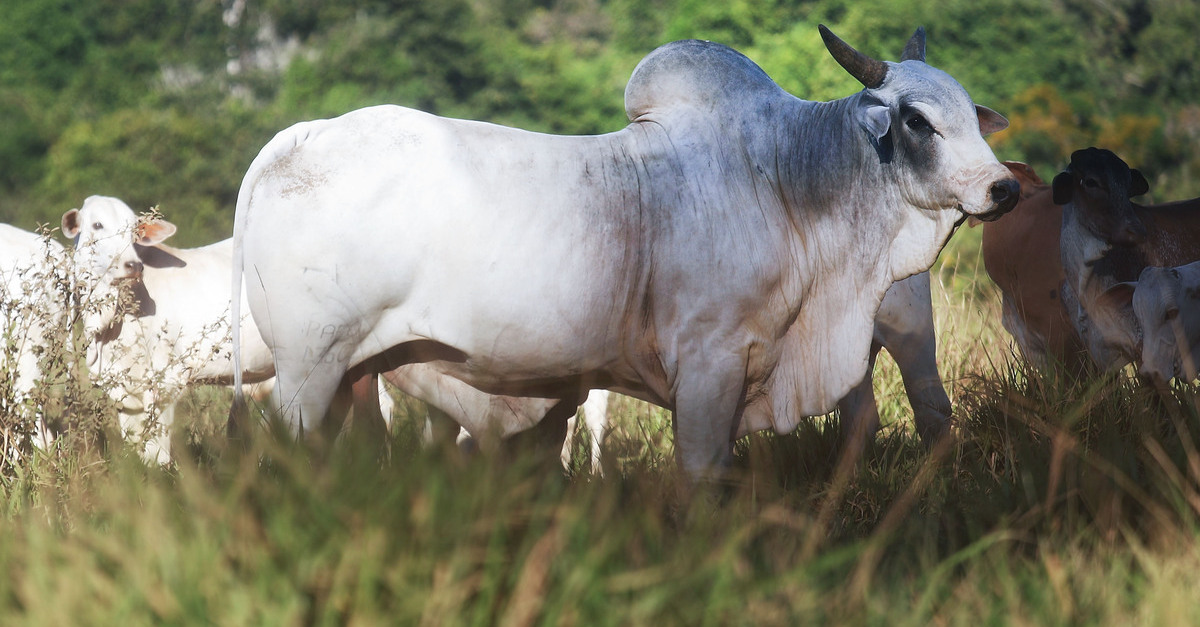
Cattle stand on a farm in Brazil after a 2017 United States suspension of fresh beef imports due to safety concerns.
A group of New Mexico ranchers made their case to the U.S. Court of Appeals for the Tenth Circuit over food companies allegedly deceiving ranchers by labeling beef “Product of the USA,” when, in reality, the cattle are raised overseas and are slaughtered and processed in the United States.
Plaintiffs Robin Thornton and Michael Lucero represent the class suing Tyson Foods, Cargill Meat Solutions, JBS USA Food Company and National Beef Packing Company. Federal law regulates beef labeling and prohibits meat products from being sold under “labeling which is false or misleading.” The United States Department of Agriculture (USDA) is the federal agency authorized to further regulate beef labeling. The plaintiffs raised claims under the New Mexico Unfair Practices Act as well as state contract law.
U.S. District Judge Kea Riggs (a Donald Trump appointee) dismissed the case in November 2020, reasoning that the beef was labeled in accordance with all applicable regulations. “Plaintiffs seek to effectively alter or change USDA approved labels which are allegedly misleading,” commented Riggs, who was not willing to do so at the district court level.
During Monday’s oral arguments, a three-judge panel on the 10th Circuit pressed attorneys on the intent behind federal beef labeling regulations, indicating that the plaintiffs may well have raised a viable claim.
Attorney Blair Dunn, representing the plaintiffs, explained the crux of the claim.
“We have a situation where we have floating feed lots that come across the ocean under really no regulation whatsoever,” he explained.
“[T]hey offload cattle, stand on American soil for minutes, maybe hours,” he continued, “Then they’re still receiving that same label, even though they didn’t really breathe much of the air here in this country, or eat much of the feed here.”
Dunn gave the court an example of a recent outbreak of mad cow disease in Brazil. Under current regulations, Dunn said, “that beef could be shipped into the U.S. from Brazil and then offered to consumers with a sticker on it saying ‘product of the United States.'”
U.S. Circuit Judge Carlos Lucero (a Bill Clinton appointee) asked attorneys for both sides about their take on Congressional intent.
“Could Congress’ law have intended to be outright deceptive to consumers in the labeling of products?” Lucero asked. “Congress couldn’t have intended that a slab of beef could be taken off a ship from China and marked ‘product of the United States’ simply because they put a little bit of plastic and a little bit [of] Saran wrap over the product, correct?”
Chief U.S. Circuit Judge Timothy Tymkovich (a George W. Bush appointee), however, seemed skeptical about the plaintiff’s position.
“But [the cows] were slaughtered and processed here, why doesn’t that make them technically a product of the United States?” Tymkovich asked.
U.S. Circuit Judge Nancy Mortiz, a Barack Obama appointee, also seemed reluctant to upend USDA labeling rules. Under USDA guidance, she commented, a label reading “product of the United States . . . does not mean the product is only from animals that were born, raised, slaughtered and prepared in the United States.”
“Whether or not I agree with them,” Moritz continued, “the agency has that definition.”
Attorney Aaron Van Oort argued on behalf of the defendant companies, arguing that it would be unfair to penalize his clients for simply following federal guidelines. “Plaintiffs can sue USDA and argue that its rules are capricious and wrong,” Van Oort said. “You can’t hold a private company liable for damages for doing what the USDA approved, while the approval stands.”
Van Oort argued federal labeling law preempts the plaintiffs’ right to sue under state law for any mislabeling.
“Not so quick,” snapped Judge Tymkovich. He asked whether federal law permits states to have concurrent jurisdiction for misbranding.
“You want us, under federalism standards, to throw out that language and say it means nothing and that the federal provision trumps,” he commented. “I don’t read it that way.”
The two continued to spar. “Where does it say that a cow from Bangladesh can be branded as a product of the United States,” asked Tymkovich.
“Of course it’s not there” answered Van Oort.
“This boils down to your view that Congress surely did intend that a cow from Bangladesh can be declared to be simply ipso facto a product of the United States,” argued the judge.
Disagreeing, Van Oort expanded on his position.
“Congress decided that there would be national standards and the USDA would set them,” he argued. “The way to challenge those is to go through USDA, not to go under state law private parties.”
Before oral arguments began, Judge Lucero and the attorneys acknowledged on the record that he and plaintiff Michael Lucero shared no known relation. “I don’t want to be deciding a case against a first cousin,” remarked Judge Lucero. “Being from New Mexico,” responded the attorney, “we totally get that.”
In an email to Law&Crime, Dunn provided the following reaction to Monday’s oral argument:
“We were pleased and appreciated the Panel’s questions yesterday, given the recent issue with BSE in Brazil it drives home how deceiving the American consumer regarding the country of origin of the beef they consume is not just a breach of the duty of honesty by the Big 4 Packers, but it is a clear betrayal of the intent of Congress in the Federal Meat Inspection Act and as noted by Judge Lucero, clearly violates the limit of federalism imposed by the preemption statute itself.”
You can listen to the full oral arguments here.
Attorneys for the other parties did not immediately respond to request for comment.
[image via Mario Tama/Getty Images]